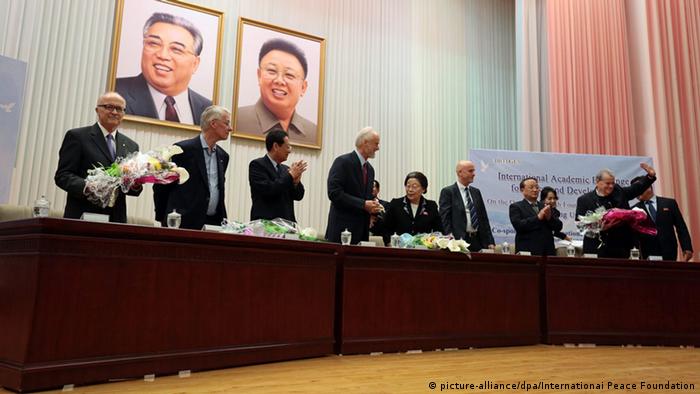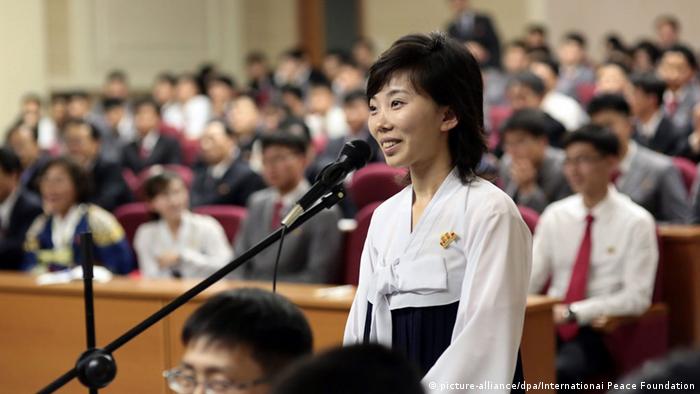Three Nobel laureates, who recently visited the isolated state, describe the extreme restrictions North Korean lecturers face in their work. an invitation to carry top students to the West has been disregarded, they tell DW.
If a North Korean scientist wants to down load tutorial literature from the information superhighway, he regularly has to get a person else to do it, Sir Richard John Roberts - a Nobel Prize winner in medicine - informed DW, following a visit to Pyongyang previous this month.
"They must ask for permission to make use of it (the information superhighway), and extra commonly they ask their question and an intermediary will down load one or extra articles," Roberts added, having been to 3 of the Communist state's universities and research facilities throughout the week-long talk over with.
He described how a excessive stage of censorship "stifles" North Korean lecturers of their skill to discover connected articles or simply browse the net.
"additionally, there changed into the issue of them now not figuring out what they have been lacking very commonly," the British academic added.
Science is censored
Roberts, who became joined by means of two different Nobel laureates, biologist Aaron J. Ciechanover and economist Finn Erling Kydland on a trip geared up by means of the Vienna-primarily based overseas Peace foundation, referred to the nation's progress changed into being hampered through the strict controls.
Ciechanover described how the travelling teachers' tour publications refused them free entry to areas they wanted to look, an issue regularly confronted by way of foreign company due to the regime's preoccupation with stage managing the country's photo to the outside world.
"whenever we asked to look a laboratory, they excused themselves with all types of motives… When requested about particular pieces of machine, they spoke of that one piece is within the Science Academy (for instance), an additional in other places," Ciechanover told DW.
He added that tuition students he met have been "advantage-hungry," describing how "the English became outstanding; in two of the three universities, we did not need translation."

The Nobel laureates say international sanctions are harming non-defense force scientific work
The Nobel trio also got the experience that North Korean students were pissed off at the constraints they faced, which protected a long time-historical equipment that Ciechanover described as "pathetically negative," and an absence of access to foreign journals, however the students had been no longer organized to talk publicly about their difficulties.
The Israeli biologist decried how "decent and clever individuals with respectable intentions bump against a complex wall of embargo," including that an absence of overseas currency to buy testing agents and equipment along with a ban on attending foreign conferences "makes involvement in modern science basically inconceivable."
Isolation doesn't aid
Kydland, a Norwegian economist who shared the Nobel Prize in 2004, informed DW we was worried that North Korean teachers lacked a powerful primary expertise of economics, because of their nation's isolation from the rest of the area.
"At two of the universities we visited, I obtained much less of a sense of their theoretical groundwork. One presentation handled concerns having to do with a self-ample economic system, now not questions of large interest on the planet," Kydland noted. He hoped that these with a passion for macroeconomics could be "tooled up" so that they could make experience of modern research.
Poverty from decades of self-imposed isolation and overseas sanctions placed on North Korea over its nuclear software were hampering non-defense force scientific work, the Western academics delivered, in a joint-call for the easing of restrictions.

The Nobel Prize winners took part in query and reply sessions at unversities throughout a week-lengthy talk over with
Two of the Nobel laureates have invited promising North Korean college students to spend a while in their laboratories, whereas the third has advised a seek advice from via DPRK students to economics conferences.
"In my case, a scholar came up to me after a lecture and become asking questions about limit enzymes, the box during which I work," referred to Roberts, who, despite making the advice to the college president, has heard nothing due to the fact leaving Pyongyang.
Kydland, who focuses on dynamic macroeconomics, turned into keen that North Korean students are given improved entry to technology and academic journals, to permit the planned exchanges to be fruitful.
"i'm excited about contributing to opening their eyes to what goes on analysis-smart within the leisure of the area. however the person would likely be somewhat misplaced unless she or he had a great foundation in the mathematical equipment, as they follow to economics."
but will they arrive?
Ciechanover turned into struck through the should attain out after listening to a talk by way of a scientist at Kim-Il-Sung university engaged on the wide field he covers.
"i noticed that she may be limited by using expertise and reagents, and provided her to return and spend time in my laboratory, all expenses should be coated by using me," he instructed DW.
Ciechanover spoke of the offers have been open-ended and lined faculty and graduate students.
or not it's hoped the Nobel Prize winners' discuss with will go some way to counter the latest combative discourse between the West and the Communist state, stated the foreign Peace foundation, who introduced that the commute took two-and-a-half years of planning to arrange.
"We desired to hearken to and interact with the young generation of the DPRK, as this could be a gateway to opening up and to establish a dialogue which might make a contribution to a much wider understanding past politics and vigour play," said Uwe Morawetz, the IPF's Founding Chairman.
Tidak ada komentar:
Posting Komentar